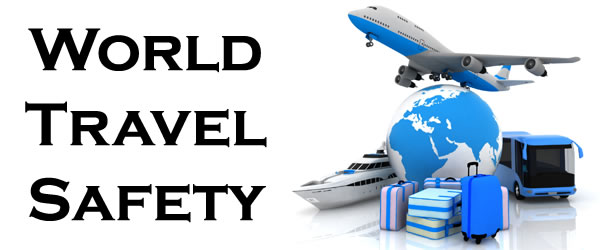Safety and security while visiting Poland Posted by Kasia on Sep 14, 2015 in Uncategorized
When you travel to another country, you always think about safety (bezpieczeńtwo). Different things happen in different countries. Here are few tips for you about traveling/staying in Poland.
The terrorism threat (zagrożenie terroryzmem) in Poland is low, however, like other countries in the Schengen zone, Poland’s open borders with its neighbors (otwarte granice z państwami sąsiadującymi) allow for the possibility of terrorist groups to enter/exit the country undetected. Please review the current U.S. Department of State Worldwide Caution for information on international and transnational terrorism operations against U.S. targets.
Poland generally has a low rate of violent crime, the incidence of street crime, which sometimes involves violence, is moderate. Major cities have higher rates of crime against residents and foreign visitors than other areas.
Organized groups of thieves (zorganizowane grupy złodziei) and pick-pockets operate at major tourist destinations, in train stations, and on trains, trams, and buses in major cities. Thieves often target overnight trains. Most pick-pocketing on trains occurs while boarding or disembarking. In a common scenario, a group of well-dressed young men surround you in the narrow aisle of the train, jostling and pick-pocketing you as they supposedly attempt to get around you. You should guard your passport, money, credit cards, and cell phone. The number of car thefts and carjacking has significantly declined over the past several years. Be wary of people indicating you should pull over or signaling that something is wrong with your car. If you pull over, you may find yourself suddenly surrounded by thieves from another vehicle. If you encounter someone indicating that there is trouble with your car, continue driving until you reach a safe spot (a crowded gas station, supermarket, or a police station) to inspect your vehicle. There have been incidents of thieves opening or breaking passenger-side doors and windows in slow or stopped traffic to take purses or briefcases from the passenger seat (siedzenie pasażera). Remember to keep windows closed and doors locked, and use parking garages and anti-theft devices. You should not leave valuables in plain sight inside vehicles, as this increases the opportunity for theft.
Under Polish law, if asked by Polish police, you must verify your identity by presenting a travel document (należy zweryfikować swoją tożsamość poprzez przedstawienie dokumentu podróży), a residence permit card (karta pozwolenia na pobyt), or an identity card issued by the Ministry of Foreign Affairs. Recently, the Border Guards (Straż Graniczna) have increased random travel document checks on trains originating from or transiting border countries. Border Guards may appear in plain clothes when requesting passports and other travel documents, which are scanned into a handheld scanner for verification. Tourists are expected to carry their passport with them at all times. Please ensure the security of your passport while traveling to prevent incidents of pick-pocketing or theft. Keep a copy of your passport bio data page (and any pages with valid visas) in a safe place separate from the passport itself; this can help you when applying for a new passport if yours is lost or stolen.
You should change money only at banks or legitimate exchange kiosks (Kantor). A legitimate offer to change money by an unknown person on the street is extremely rare and would almost certainly be a scam. Automated teller machines (ATMs – bankomaty) are widely available throughout major cities in Poland. Most Polish ATMs offer instructions in multiple languages and allow access to U.S. bank accounts.
Try to use machines at more secure or heavily traveled and monitored locations, such as commercial banks, large hotels, shopping malls, and airports. You should notify your bank of all international travel before you leave the United States, and monitor your personal bank account after traveling.
Polish bars and dance clubs are generally safe for the vast majority of visitors. However, as in many cities, people may approach you with offers of illicit drugs or prostitution, which are against the law in Poland. Be mindful that security personnel at nightclubs could respond more forcefully than at similar venues in the United States. Whereas casinos and gaming establishments are government-regulated, some are affiliated with, or have attracted the interest of, organized crime.
VICTIMS OF CRIME (Ofiary przestępstwa): If you or someone you know becomes the victim of a crime abroad, you should contact the local police and the nearest U.S. embassy or consulate. They can:
Replace a stolen passport;
Help you find appropriate medical care if you are the victim of a violent crime, such as assault or rape;
Put you in contact with the appropriate police authorities and, if you want us to, we can contact family members or friends; and
Help you understand the local criminal justice process and direct you to local attorneys, although it is important to remember that local authorities are responsible for investigating and prosecuting the crime.
The local equivalent to the “911” emergency line in Poland is 112.
One more tip: There has been a significant influx of asylum seekers into Europe, causing localised disruption to cross-border road and train transport services. Travellers should be aware of the possibility of further disruptions, make appropriate contingency plans and follow the instructions of local authorities.
Safe travels!

Build vocabulary, practice pronunciation, and more with Transparent Language Online. Available anytime, anywhere, on any device.
About the Author: Kasia
My name is Kasia Scontsas. I grew near Lublin, Poland and moved to Warsaw to study International Business. I have passion for languages: any languages! Currently I live in New Hampshire. I enjoy skiing, kayaking, biking and paddle boarding. My husband speaks a little Polish, but our daughters are fluent in it! I wanted to make sure that they can communicate with their Polish relatives in our native language. Teaching them Polish since they were born was the best thing I could have given them! I have been writing about learning Polish language and culture for Transparent Language’s Polish Blog since 2010.




